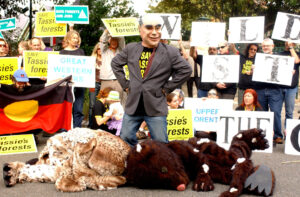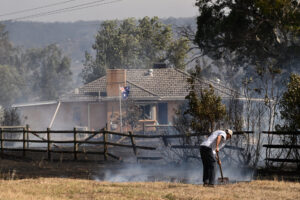Imagine this. You’re a State Government minister. Your department and the most powerful industry it regulates are under fire for failing to comply with your government’s own guidelines.
Courts, the media and community groups keep complaining that the industry breaks the guidelines and your department lets them get away with it.
Even the consultants you commission to write an “independent” review end up saying that the industry is acting “in a manner that is inconsistent with well-established principles and the NSW Government’s November 2012 Guideline.”
What do you do in this situation? You could instil some discipline in your department. You could crack down on the rogue industry…
…or you could change the guidelines.
This is what former NSW Planning Minister Pru Goward did.
The NSW coal industry and their legions of economic consultants were writing reports that were “simply not credible” according to the Planning Assessment Commission.
The Commission found that Goward’s department had a “staggering” inability to see the flaws in some of the coal industry’s economic reports.
But rather than spilling blood in her department or, heaven forbid, taking on the coal industry, Goward told her department to go away and write new guidelines.
The problem was that as the coal boom winds down and prices decline, the economic claims in the miners’ assessments just don’t stack up anymore. Justifying mining’s impact on other industries, communities and the environment with promises of jobs and money was getting harder and harder.
For example, the Cobbora coal project near Dunedoo promised Planning that it would deliver a net economic benefit of $2 billion dollars and over 3,000 jobs to offset the damage it has caused to the local farming economy.
But late last year the government had to admit that the project wouldn’t be developed because it simply isn’t viable.
Even the Planning Assessment Commission is starting to catch on – it rejected the Coalpac mine near Lithgow, finding extraction of that coal would have “limited economic and social benefit”.
With coal mines being rejected on the basis of economics, Planning and the miners either needed to change the coal market or change economics.
It’s much easier to change economics – or at least to water down the economic assessment guidelines.
So in June last year, Goward and her department decided that “we need an improved [economic] framework…for more robust assessment.”
To come up with new economic assessment guidelines, who do you think Goward and her planners consulted with? Economists? Academics? The public?
Of course not. They went straight to mining companies, their consultants and the NSW Minerals Council. To date, the mining industry is the only group outside the government to have input into the new guidelines.
Just to make this clear – the mining industry is writing its own rules in NSW.
Not only has the public had no chance to comment on the new guidelines, we’re not even supposed to know they’re being developed.
This had all been done in secret until consultants to Centennial Coal’s Airly mine just couldn’t wait to show off their new rules.
They were tired of the “expected orthodoxy” of actually having to prove that a mine was going to be viable and of benefit to the state. They laughed off criticism of their inability to comply with existing guidelines, saying:
The fact that the Department of Planning and Environment is now developing [new] guidelines … demonstrates that different approaches are relevant.
The new guidelines will “avoid those parts of orthodox practice that largely serve to detract from the ability of ‘lay’ stakeholders to comprehend the analysis presented”.
In other words, the suckers – ahem – lay stakeholders will be given some “lay economics” that they can understand – big jobs claims without any pesky orthodox calculations backing them up.
But while orthodox economics is being sidelined, no one is suggesting that mine plans be based on “lay geology”. The coal rail proposals are still based on very orthodox engineering.
Fortunately there is a new Planning Minister at Macquarie Street.
Rob Stokes has an opportunity to reverse Goward’s capitulation to her department and the coal industry. He can restate NSW government support for the existing guidelines based on text-book economics and Treasury advice.
He can also commit to involving the public when changing policy.
Imagine that. A Planning Minister not beholden to the coal industry. It’s not so hard to imagine, is it?
Rod Campbell is the Director of Research at The Australia Institute.
Related documents
Between the Lines Newsletter
The biggest stories and the best analysis from the team at the Australia Institute, delivered to your inbox every fortnight.
You might also like
Why a fossil fuel-free COP could put Australia’s bid over the edge
When the medical world hosts a conference on quitting smoking, they don’t invite Phillip Morris, or British American Tobacco along to help “be part of the solution”.
Burning homes and rising premiums: why fossil fuel companies must pay the bill
Another summer, another round of devastation: homes lost, communities evacuated, lives upended.


